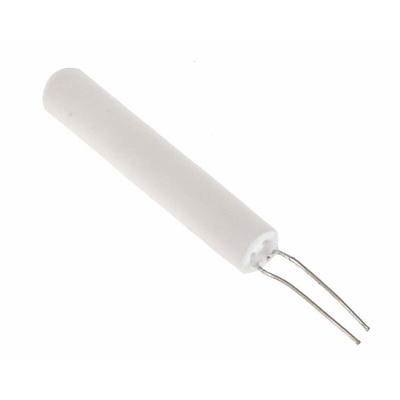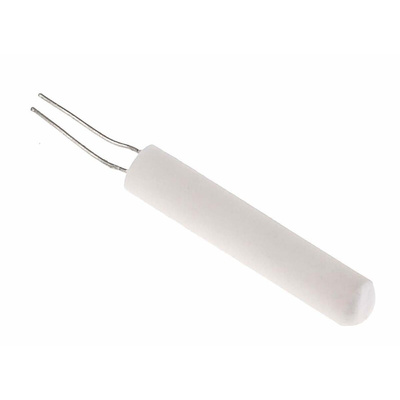* УТОЧНЯЙТЕ ВОЗМОЖНОСТЬ, ЦЕНУ И СРОК ПОСТАВКИ, В СВЯЗИ С ОГРАНИЧЕНИЕМ ЭКСПОРТА ТОВАРОВ ИЗ СТРАН ЕС И ВЕЛИКОБРИТАНИИ
RS Pro Wire Wound Pt100 PRT Sensing Element
From RS Pro a high-quality and reliable Pt100 PRT (Platinum Resistance Thermometer) or RTD (Resistance Temperature Detector) wire wound platinum sensing element. The cylindrical shape of this wire wound element makes it ideal for housing within a protective metal tube or sheath. This wire wound Pt100 sensor is designed for optimum performance and stability and provides an accurate and reliable temperature measurement for a wide range of applications.
What is an RTD?
An RTD is a type of temperature sensor based on the correlation between metals and temperature. As the temperature of a metal increases so does its resistance to the flow of electricity. This resistance can be measured and converted to a temperature reading. In a Pt100 RTD, the ’Pt’ stands for platinum (platinum wire or film) and ’100’ means that the temperature sensor has a resistance of 100 Ohms at 0°C. Platinum is the most reliable metal due to its linear resistance to temperature relationship over a large temperature range.
What is a Wire Wound Sensor Element?
This wire wound PRT sensor element consists of a pure platinum wire which is wound into a miniature spiral. This wire spiral is then located inside axial holes in a high purity alumina ceramic rod. The design of Pt100 sensor elements gives the platinum wire freedom of movement when it expands and contracts in response to heating. This produces increased stability and accuracy in the final temperature as it eliminates anomalies in resistance which can be caused by constricted wires. The only drawback with these Pt100 elements is that they are vulnerable to shock and vibration
Features and Benefits
• Long-term stability
• High accuracy
• Wide temperature measurement range of -200 to +650°C
• 2 lead wires
• Cylindrical shape ideal for insertion into housing or sheath
Applications
These wire wound temperature sensor elements are suitable for use in a wide range of applications and industries
• Automotive
• Chemical industry
• Micro-electronics
• Air conditioning and refrigeration
• Air, gas and liquid temperature measurement
• Food processing
• Laboratories
Frequently Asked Questions
How Does a PRT Temperature Sensor Work?
The PRT temperature sensor works by placing the sensor element (or process end) into the equipment or process that requires temperature measurement. As the temperature of the platinum resistance thermometer increases it’s resistance to the flow of electricity increases. For every increase per degree of temperature the electrical resistance also changes by a set ratio, this is called the temperature coefficient. For platinum, this ratio is .00385 ohm/ohm/°C which means for a Pt100 with a 100 ohm resistance the increase in resistance per degree of temperature would be 0.385 ohms. The total resistance reading can, therefore, be measured and converted into temperature.
How is the Resistance Measured?
The resistance generated by the temperature sensor is measured by passing current through one of the wires to produce a voltage. This voltage is then measured using a suitable bridge or voltmeter and the resistance calculated in ohms using Ohm’s Law (R=V/I). Once the resistance is known you can convert it to a temperature reading using a calibration equation or a Pt100 table. A temperature measurement device or calibrator can also be connected to the leads of the probe that will automatically convert the measured resistance into a temperature reading.
Техническая спецификация RS PRO PRT Selection Guide
RS PRO PRT Selection Guide RS PRO Cables Guide
RS PRO Cables Guide RS PRO Connectors Guide
RS PRO Connectors Guide RS PRO PRT Guide
RS PRO PRT Guide RS PRO Thermocouple Guide
RS PRO Thermocouple Guide RS PRO Datasheet
RS PRO Datasheet RS PRO Datasheet
RS PRO Datasheet| Самовывоз со склада поставщика в Екатеринбурге | Забираете сами или вызываете курьера |
| ТК Деловые Линии | от 500 руб |
| Курьером EMS Почта России | от 500 руб |
| Другой транспортной компанией | По согласованию |



